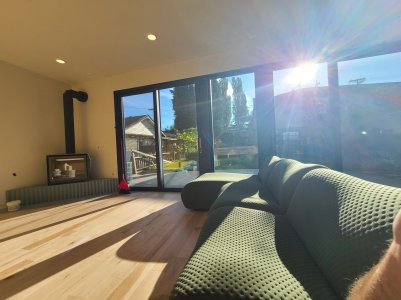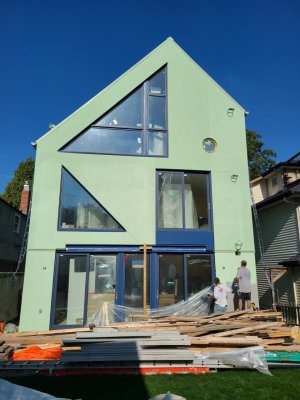Aquaholic
Crew Member
Wood heat for the win for sure, but a dying option in many areas. Wood heat warms to the bone, an amazing feeling.Totally agree. Unfortunately wood heat feels the best to me and miss it
Wood heat for the win for sure, but a dying option in many areas. Wood heat warms to the bone, an amazing feeling.Totally agree. Unfortunately wood heat feels the best to me and miss it
We have a natural gas furnace and supplement with a wood burning insert.Totally agree. Unfortunately wood heat feels the best to me and miss it
Mine is set the same, kick in at 4 degrees. I've tried lower but because heat from a pump comes in at a lower temperature than from a furnace, it takes too long to reach a comfortable temperature.Ya about that heat pump / gas furnace situation, we have a HE gas furnace and heat pump, all trane, about 8 years in. The furnace has been set to kick on around 4 degrees C, and has been set lower but the last tech raised it. The heat pump is a trane xb13will dig out the exact model of heat pump but what is the school of thought around when the furnace should kick in vs heat pump?
3200 Sq ft split level, all insulation at and beyond code etc...0 C?
Thanks for taking the time for the detailed response and sharing your knowledge on the subject.No, straight up energy efficiency in terms of energy converted to usable heat.
Resistance coil (baseboard heater, backup coil, immersion hot water tank): 100% Coefficient Of Performance = 1.0
Condensing gas furnace: 92-94% COP, 0.92-0.94
Heat pump: 200-400%, COP 2.0 - 4.0 (varies with outdoor temp)
The worst case scenario for a heat pump, when the backup coil is going full bore, is still better at converting energy to heat than the best gas furnaces, where some heat is still lost out the vent with exhaust gases.
Cost of energy is a different matter. At the moment in BC:
Natural gas, $9.23/GJ
Electricity @$0.0975/kWh = $27.18/GJ
Gas is a currently a cheaper fuel per unit energy than electricity, but using a modern heat pump can overcome that. The cold climate models now on the market can comfortably operate at >200% efficiency in -25°C.
In homes that already have a gas furnace, you are probably able to install a regular heat pump and keep the furnace as backup heat. Below about -10, the furnace kicks in. Saves the purchase cost of the cold climate pump or backup heat coil, and the running cost of backup coil on a cold day.
Generally it’s around the 5°C mark but there is some new technology out there that can accommodate some low ambient temps.Ya about that heat pump / gas furnace situation, we have a HE gas furnace and heat pump, all trane, about 8 years in. The furnace has been set to kick on around 4 degrees C, and has been set lower but the last tech raised it. The heat pump is a trane xb13will dig out the exact model of heat pump but what is the school of thought around when the furnace should kick in vs heat pump?
3200 Sq ft split level, all insulation at and beyond code etc...0 C?
Get a new tech. One of the best purchases we have made was a Carrier commercial roof top model ( but its on the ground) 15+ years ago and still chugging along. When the valves cycle ( so I am told ) that is what makes the noise when it defrosts itself automatically. I was also told that there is no need to prevent water getting into the pump even when its freezing and electric heat cuts in.. WRONG. I have a sheet of 1/2 in plywood on an angle that deflects 80% of rain and snow without interfering with the efficiency of the unit... no more getting turned into an ice creamMy heat pump makes some weird banging noise when it cuts in on colder days, minus temperatures. It is a 13 year old Trane modal. Had a tech look at it and he said I shouldn't operate it on colder days and switch it to e-heat.
Does that make sense?
We have the same set up and we love it! Very economical to runGenerally it’s around the 5°C mark but there is some new technology out there that can accommodate some low ambient temps.
I wouldn't trade my natural gas with an outdoor unit for cooling for a heat pump anyway. And I work on this stuff for a living … well mostly bigger stuff but the principals are the same .
No, straight up energy efficiency in terms of energy converted to usable heat.
Resistance coil (baseboard heater, backup coil, immersion hot water tank): 100% Coefficient Of Performance = 1.0
Condensing gas furnace: 92-94% COP, 0.92-0.94
Heat pump: 200-400%, COP 2.0 - 4.0 (varies with outdoor temp)
The worst case scenario for a heat pump, when the backup coil is going full bore, is still better at converting energy to heat than the best gas furnaces, where some heat is still lost out the vent with exhaust gases.
Cost of energy is a different matter. At the moment in BC:
Natural gas, $9.23/GJ
Electricity @$0.0975/kWh = $27.18/GJ
Gas is a currently a cheaper fuel per unit energy than electricity, but using a modern heat pump can overcome that. The cold climate models now on the market can comfortably operate at >200% efficiency in -25°C.
In homes that already have a gas furnace, you are probably able to install a regular heat pump and keep the furnace as backup heat. Below about -10, the furnace kicks in. Saves the purchase cost of the cold climate pump or backup heat coil, and the running cost of backup coil on a cold day.
As previously mentioned I have a heat pump with electric back up. (10 yrs old)My hydro and gas bill are on the equal payment plan thing . I have a regular hot water tank about 4 years old and my high efficiency furnace 10+ years old . House is 55 years old .
Fortis - 86
Hydro - 135
There is some months we pay less or don’t pay at all.
What is the electricity bills with folks running all electric heat pumps and back up electric heat . Electric hot water etc .
The one sure path to making heat pump work is to put it in a home with a top quality building envelope, insulation and doors/windows. A really tight envelope needs little energy to heat and cool, no matter which energy source is used. In the real north, this principle is absolutely critical. If the insulation isn't at modern (<10 yrs) levels and the home leaks air, then the energy bleed would lead you to use the least expensive energy source.This doesn't work for us up here in the Peace. Nat gas furnace, central air system in our house, 2000 sq ft. Nat gas hot water
I sat down and looked at how a heat pump would work/benefit us.
If we used the -10 setting, I figure, in an average year, we would need the heat pump for Sept, Oct, March and part of April. Lets say 4 month of the year. The rest of the year would be either the furnace (too cold for the heat pump), don't need the heat or central air.
Even if they made them efficient to -25, it would only add a couple more months (still get a few weeks, equals a month an a half or more) of -30 to -40 and for the extra cost would not fit into our budget.
This is just a quick look at what I have found on the net and info for the local HVAC companies.
Cheers
SS
We just wrapped up our latest Net Zero home. Scored a .76 ACH with an attached garage. The house has a heat pump hwt and an outdoor unit for heating and cooling. It also has a sealed wood burning fireplace which heats the whole damn house in minutes. The biggest challenge with it is overheating from all the East facing windows. Even on a cooler day the cooling kicks in for most of the morning. Architects will need to be more and more thoughtful of Solar heat gain when designing these homes. Right now people are just wanting the bonus 15% square footage the city gives you for building a net zero home in Vancouver. The second picture was when we took the scaffold down and that's the East side of the house.The one sure path to making heat pump work is to put it in a home with a top quality building envelope, insulation and doors/windows. A really tight envelope needs little energy to heat and cool, no matter which energy source is used. In the real north, this principle is absolutely critical. If the insulation isn't at modern (<10 yrs) levels and the home leaks air, then the energy bleed would lead you to use the least expensive energy source.
In some homes, upgrading insulation and improving airtightness are relatively easy; others are not. Working on building envelope should always happen before considering the mechanical stuff installed inside. Lowering overall energy demand works for decades.


Ehh putting some shade canopies on those windows won't be easy.We just wrapped up our latest Net Zero home. Scored a .76 ACH with an attached garage. The house has a heat pump hwt and an outdoor unit for heating and cooling. It also has a sealed wood burning fireplace which heats the whole damn house in minutes. The biggest challenge with it is overheating from all the East facing windows. Even on a cooler day the cooling kicks in for most of the morning. Architects will need to be more and more thoughtful of Solar heat gain when designing these homes. Right now people are just wanting the bonus 15% square footage the city gives you for building a net zero home in Vancouver. The second picture was when we took the scaffold down and that's the East side of the house.
View attachment 99489View attachment 99490
